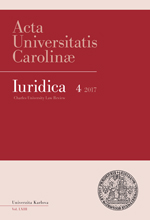Právní teorie a ústavní legislativní proces
The Theory of Law and the Constitutional Legislative Process
Author(s): Clemens JablonerSubject(s): Law, Constitution, Jurisprudence
Published by: Univerzita Karlova v Praze, Nakladatelství Karolinum
Keywords: Pure Theory of Law; Austrian constitution of 1920; constitutional law in the former sense; hierarchical theory; constitutional review; the ‘three circles theory’; European constitution
Summary/Abstract: The Theory of Law and the Constitutional Legislative ProcessKelsen’s approach to the role of the constitution in the state and the principles, by which the legal order should be construed, can be found in his famous work ‘Pure Theory of Law’ as well as in the first constitution of the First Austrian Republic from the 1920, which Kelsen co-authored. The constitution of 1920 was heavily influenced by the current state of affairs,i.e. the post-war disintegration of values and despondency, which called for a constitution, that would, above all else, be legally perfect and able to fulfil its function as a set of fun- damental rules principles governing the otherwise disjointed state. This idea corresponded with Kelsen’s own views on the constitution as the basic norm, a fundamental legal rule from which all other legal rules derive their authority and with which they must all comply. Kelsen’s approach to the creation of the constitution can be described as formal – he favoured stern, accurate language over florid declarations with no binding force, and placed great im- portance on the form of constitutional law. In accordance with his hierarchical theory, consti- tutional law should be only understood as such when specifically marked as ‘constitutional law’ – constitutional law in the former sense – and should only be changed or repealed by other ‘constitutional law’ legal rule. One of the hallmarks of Kelsen’s work is undoubtedly the introduction of the principle of constitutional review, the Austrian constitution of 1920 is (along with the Czechoslovakian constitution of 1919) hailed as the first modern European example of the constitutional review. Many of Kelsen’s ideas (mainly established in the Pure Theory of Law) are relevant to this date, especially his insistence on the accuracy of legal language and on the exclusive role the constitution plays in the legal system, as can be seen in the long-standing debate about the so called ‘European constitution’.
Journal: Acta Universitatis Carolinae Iuridica
- Issue Year: 63/2017
- Issue No: 4
- Page Range: 31-41
- Page Count: 11
- Language: Czech

